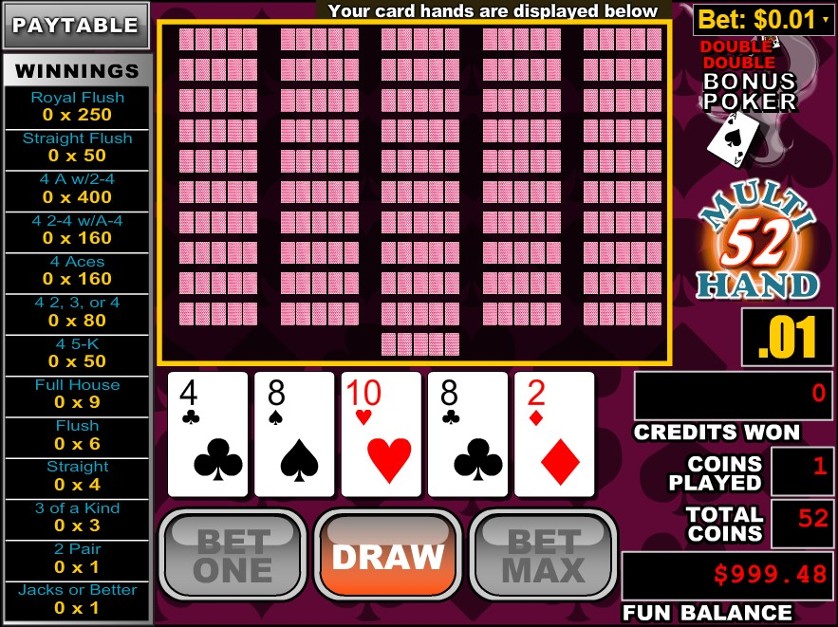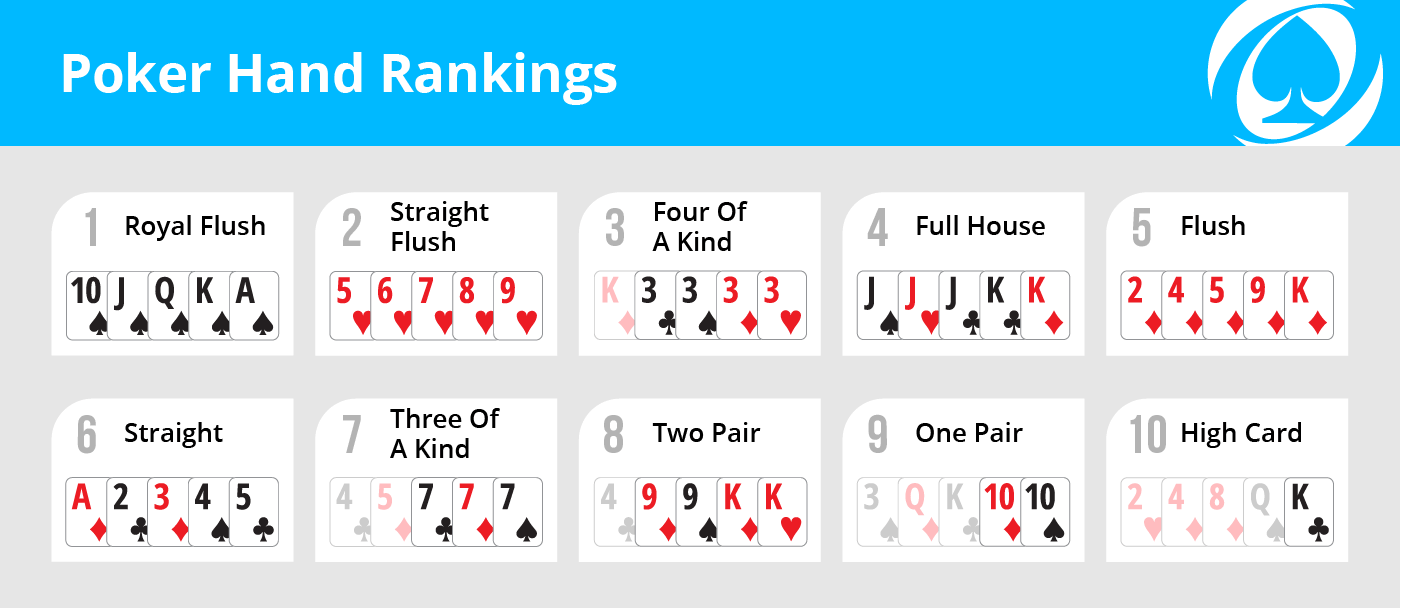Double Deck Poker Hands
- Card rooms use one deck for poker. With two decks 5 of a kind would be harder to make than a straight flush. So I would consider them to beat all the straight flushes, including the royal.
- Poker Hand Probabilities. Mark Brader has provided the following tables of probabilities of the various five-card poker hands when five cards are dealt from a single 52-card deck, and also when using multiple decks. The traditional hand types are described on the poker hand ranking page. These include one hand that belongs to two types at once.
- One of the most exciting Blackjack games, Double Deck Blackjack games are available at PokerStars Casino in both Single Player and Multi-Player modes.
In poker, players form sets of five playing cards, called hands, according to the rules of the game. Each hand has a rank, which is compared against the ranks of other hands participating in the showdown to decide who wins the pot. In high games, like Texas hold 'em and seven-card stud, the highest-ranking hands win. Double-Deck Blackjack Strategy Introduction. To use the basic strategy, look up your hand along the left vertical edge and the dealer's up card along the top. In both cases an A stands for ace. From top to bottom are the hard totals, soft totals, and splittable hands. There are two charts depending on whether the dealer hits or stands on soft 17.
Double Deck Poker Hands Game
Double Hand Poker
Double Hand Poker is played with a standard 52 card deck plus one joker. The value of the joker is the same as draw poker. The joker counts as an ace, or may be used to complete a straight, or a flush. It must make the hand in which it is placed as high as possible. Double Hand Poker is dealt on a poker table to a maximum of 7 (seven) positions. The house dealer controls the shuffling and the dealing of the cards, controls the orderliness 01 the game, and collects time charges based on a fixed fee schedule.
At no time does the house dealer participate in the actual play of the game and has no interest in the outcome of the play. In each round of play, 7 hands are dealt. Each hand contains 7 cards, all dealt face down. After the cards are dealt, the designated player will select the hand to be distributed first. Th4:dice cup will then be shaken by the designated player to determine which seated player receives the first hand. Seated players arrange their 7 cards into 2 hands. They place their card! face down with the 2-card hand in front and the five-card hand in back. The 5-card hand must be of a higher rank than the 2-hand card.
DOUBLE HAND POKER
The ranking of hands is the same as in Draw Poker. It order to win, both hands must beat both hands of your opponent The designated player position moves clockwise around the table.
DOUBLE HAND POKER RULES
- Each table has a limit defining the minimum and maximum amounts that may be wagered on each betting position. There is no maximum on the designated player's wager.
- The house charges time based on a fixed fee schedule. Each betting circle pays the same fee regardless of the size of the wager.Time is charged for the use of the facilities, services, an personnel of the house. At no time does the house place beu collect winnings or pay losses. No player ever plays against c makes a wager against the house.
- Chips should only be sold at the table by the dealer c floorman.
- All action goes clockwise,starting with the action button.
- All cards must stay on or above the table surface and remain i clear sight of the house dealer.
- A non-seated player may bet in association with a seated player. Ifthe seated player and the non-seated player disagree over the play of the hand, the player with the largest wager in action makes the final decision. If two or more players have equal bets on a spot and disagree on the play of the hand, the seated player will have the final say. The smaller bettor may check the hand only with the larger bettor's permission. If the larger bettor refuses, the smaller bettor may have the dealer check to make sure the hand is not foul.
- In the designated player position, the player who is the primary player (the player who shakes the dice cup) shall make the decision on how the hand is to be set, even if his wager is not the largest.
- A player has a foul hand, if;
a) the 2-card hand is stronger than the 5-card hand.
b) the player does not have exactly 2cards in the front hand.
c) the player does not have exactly 5 cards in the back hand.
d) the player does not protect his hand and it comes in contact with other cards. The player with the fouled hand may lose his wager to the extent that the designated player's wager covers. - If two or more are dealt the wrong number of cards it is a misdeal. If one player receives only 6 cards, he may take the top card off the deck and play will continue (providing that the stub of the deck is correct). If one player is dealt 8 cards, his hand is dead. His time will be returned and play will continue.
- A player may wager in more than one position. However, a player may see and/or participate in the setting of only one hand regardless of the number of positions on which he has wagered.
- Any active player is entitled to ask the house dealer the amount of the designated player's bet, to the extent that it affects the asking player's wager.
- A player cannot be the designated player in a given position unless that player had a wager on that position the previous hand.
- If the designated player does not take the second bank for any reason (goes broke, leaves the table, etc.), any other player who had wagered at that position may exercise the option to take the second bank.
- A boxed or exposed card on the deal will be replaced after the completion of the deal by the first card off the stub. Two or more boxed or exposed cards is a misdeal. If the joker or an ace is boxed or exposed it is a misdeal. A card can only be exposed by the house dealer.
- All bets are final when the dice cup is opened. Any player touching his bet after the dice cup has been opened risks possible forfeiture of his wager to the extent that the designated player's money covers.
- All bets must be placed with the largest denomination chips on the bottom and the smallest denomination chip on the top. Bets must be in increments of $5.00. .
- The house will not hold up action or be responsible for settling disputes that arise from 'cum-cum'(partnership) bets. 'Cumcum' bets will be paid off and/or collected as one bet.
- All conversation during play of a hand should be in English.
- Players may not show or discuss their hands with other active players before the final setting of the designated player's hand.
- When the designated player's hand has been opened, no one may touch his cards or wager. This may cause the player's wager to be forfeited to the extent that the designated player's money covers.
- All players are responsible for protecting their own hands. If a player's hand is declared foul, the wager is forfeited to the extent that the designated player's money covers.
- The designated player's hand is not set until he has had a chance to consider the options. The designated player must signify his or her final decision in an obvious manner to the house dealer.
- If a player's front hand has the same value as the designated player's front hand, it is called a 'copy'. The designated player's front hand is then considered the winner. The copy rule is also applied to the back hand.
- A player cannot surrender his hand. All hands must be shown by the house dealer.
- No side bets or proposition bets of any kind will be allowed.
- Players are responsible for the final setting of their hands. The house dealer or supervisor may assist and/or offer advise upon request, but is not responsible for the final decision.
- If the house dealer or supervisor mistakenly sets a hand foul, it will be set the most logical way by the Floor manager and play will continue.
- All floorman's decisions are final.
- Management reserves the right to make decisions that are in the best interest of the game, even if a strict technical interpretation of the rules might indicate a contrary decision.

- Appendices
- Miscellaneous
- External Links
On This Page
Introduction
To use the basic strategy, look up your hand along the left vertical edge and the dealer's up card along the top. In both cases an A stands for ace. From top to bottom are the hard totals, soft totals, and splittable hands. There are two charts depending on whether the dealer hits or stands on soft 17.

Other basic strategy rules.
- Never take insurance or 'even money.'
- If there is no row for splitting (fives and tens), then look up your hand as a hard total (10 or 20).
- If you can't split because of a limit on re-splitting, then look up your hand as a hard total, except aces. In the extremely unlikely event you have a pair of aces you can't re-split and drawing to split aces is allowed, then double against a 5 or 6, otherwise hit.
Ideally, the basic strategy shows the play which, on average, will result in the greatest win or the least loss per initial hand played. The way I usually go about this is to look at the initial 2-card hands only. Generally, this will result in the overall best play. However, soft 18 against a dealer ace when the dealer stands on soft 17 provides the only known exception that I am aware of for any number of decks. As my blackjack appendix 9 shows, a 2-card soft 18 vs A has an expected value of hitting of -0.100359, and of standing -0.100502. So with two cards it is very slightly better to hit. However, not all soft 18's are composed of two cards. The more the cards in the player's hand the more the odds favor standing. Simulations show that if forced to always hit or always stand, it is better to stand. I would like to thank Don Schlesinger for bringing this unusual play to my attention.
Double Deck Poker Hands Signals
